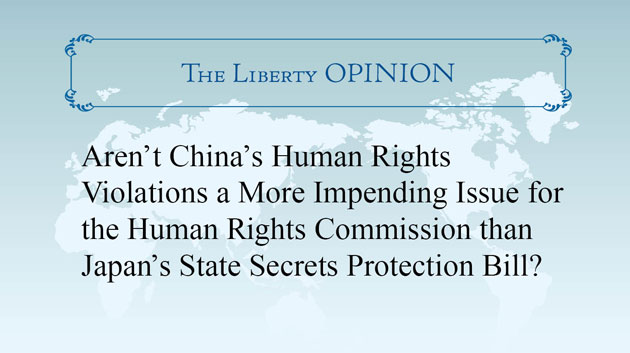Aren’t China’s Human Rights Violations a More Impending Issue for the Human Rights Commission Than Japan’s State Secrets Protection Bill?
As the Abe administration seeks to pass the state secrets protection bill on December 2, the United Nations Human Rights Chief, Navi Pillay is urging Japan to proceed cautiously, saying that the bill “contains provisions that are vague about what constitutes state secrets”. How should we view this remark? Below is our opinion on the comments made by Dr. Pillay.
While the Asian situation is becoming more tense, comparison and balance between the legal benefits of the right to free access to information and the security of a nation have become extremely important.
China has been showing threatening moves, such as setting the Air Defense Identification Zone over the East China Sea, including the Japanese territory of the Senkaku Islands. This is a grave concern.
The implementation of the state secrets protection bill, which imposes stiffer penalties for leaking secrets and other activities deemed harmful to state security, is therefore vital for maintaining peace in Asia.
This bill should be considered not only from the perspective of one single nation, but also from the standpoint that fulfils its responsibility for fostering world peace.
From a macroscopic perspective, we strongly believe that the state secrets protection bill must be pushed forward without delay.
While there certainly needs to be clear criteria for what should or should not be considered a state secret , we believe that whether something is to be deemed a crime, or appropriate, should be decided through judicial proceedings.
We doubt it is appropriate for a representative, who is neither a Japanese citizen nor a member of the Diet (the Japanese Parliament), to make such comments on the bill under discussion, especially since he or she has never even been called before the Diet as an unsworn witness. It seems to be a serious violation of the rights and democracy of the people of Japan.
We believe it is an important part of the Commissioner’s mission to maintain world peace, since it is impossible to respect human rights without maintaining peace in the world. Thus it is the U.N. Human Rights Commission’s task to continue to criticize the violation of human rights in China before voicing an opinion on the state secrets protection bill of Japan.



















